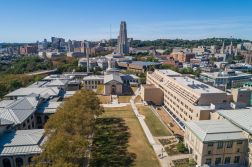Georgia State plans to improve student career outcomes by sharing job data

Georgia State University plans to create and expand information systems designed to help students find a job, using a $250,000 grant announced last week.
The funding is part of a $10 million effort by the higher education nonprofits Strada Education Network and the Taskforce on Higher Education and Opportunity to improve career outcomes at higher education institutions. GSU expects to build out current initiatives, including “Career Explorer” pages that collect data for career outcomes for each major and courses on common workplace software, and hire a designer to work on a digital learner record, College to Career faculty director Angela Marie Christie told EdScoop.
GSU’s College To Career program breaks down degrees into skills and competencies, with a goal of giving students and faculty a common language to describe what students learn during their education and provide insight on how to match skills up with jobs and employers. “College Explorer” pages scrape employment data for GSU graduates in each major, breaking down job titles and salaries, and share analytics from career readiness platform SteppingBlocks.
“The reason that this is so compelling for students and for faculty alike is that there are always surprises there,” Christie said. “For instance, one of the top employers for our English majors here at Georgia State University is the Center for Disease Control. The CDC is looking for people who have strong writing abilities, who can write grants, who can publish reports and things like that and so that part of the Career Explorer is very valuable to students, because it gives them a more realistic idea of what that major can do.”
Many higher education institutions and advocacy groups are now mapping coursework and professional experiences to skills, allowing students to better market themselves. About 75% of human resources representatives said their companies used a system or central bank for competencies that they would use during the hiring process, according to a 2021 survey by the nonprofit 1EdTech Foundation. Competencies refer to a level of expertise that encompasses a number of skills. For example, GSU defines managing podcast creation and translating data as skills that build competency in digital technology.
Christie said students may not consider applying to certain jobs or companies because they’re not sure whether their experience is applicable. The career pages also break down the skills that students in each major learn through their degrees and lists certain courses under each skill so students know which classes to take.
Developing a so-called GSU “skills briefcase” would then create a digital learner record of student skills and store links to coursework that illustrates each skill. Christie said GSU plans to hire a designer to build an outline or demo within the school’s learning management system by the end of the year.
“It will show how many times they practice that skill, and the assignments for which those skills are associated,” she said. “It’ll help them articulate better out on the job market how they earned those skills and provide them with the real examples that they need when they’re sending out cover letters and and things like that.”




